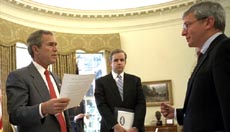
|
Use of Public-Private Competition Continues to Focus on Highly Commercial Activities
Competitions completed and announced during the third quarter of FY 2007 again demonstrated that many agencies are applying competitive sourcing as a management tool to a wide range of highly commercial activities. Activities in competitions completed in the third quarter included:
Announced competitions included activities for:
Despite the continued responsible use of public-private competitions, a number of proposed limitations in appropriations and authorization bills would unnecessarily curb use of this successful management tool, depriving taxpayers of significant savings and new-found efficiencies. For example, one limitation enacted in the Emergency Supplemental Appropriations Act for FY 2007, which denied funding to DOL's Mine Safety and Health Administration, forced DOL to abort a completed competition for administrative support that promised to save the department many millions of dollars. A proposed prohibition would block use of competitive sourcing by the Corps of Engineers which, in the last quarter, entered into a letter of obligation with the Most Efficient Organization established through a competition managed by the Corps that is expected to save $950 million over six years. The Corps' competition served as a catalyst for a needed consolidation of redundant IT activities which had been performed at more than 50 locations. The Administration will continue to fight restrictions to this proven management practice that is allowing federal managers across government to improve the government's work efficiency and save taxpayers nearly $7 billion along the way. |